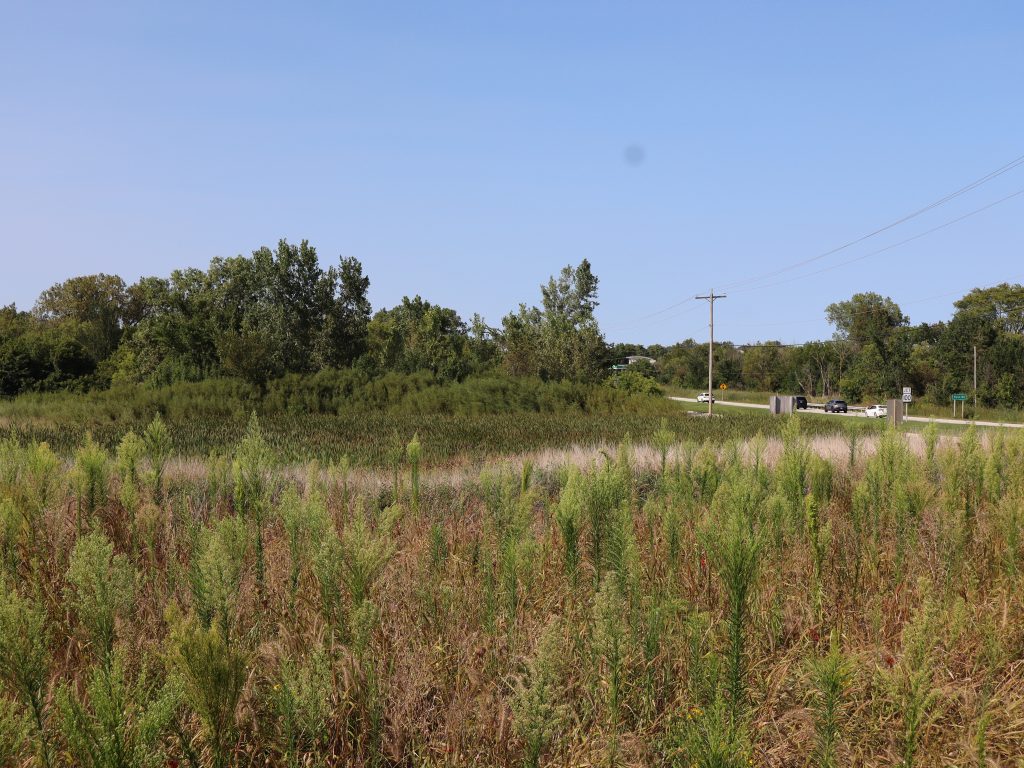Contaminated Franklin Gas Station Will Be Studied, Then Sold
State grant will fund environmental assessment of property foreclosed by county.

View looking north of 9677 S. 27th St., shrouded by trees, from Seasons at Franklin. Photo taken Aug. 21, 2024 by Graham Kilmer.
State funding will be used to identify just how polluted the area around a former gas station in Franklin is.
Milwaukee County received a grant this month from the Wisconsin Department of Natural Resources (DNR) funding environmental assessment of a property at 9677 S 27th St. The property came into the county’s possession through tax foreclosure in 2017. The site was used as a gas station and truck stop in the 1960s and 1970s, according to the DNR.
The assessment will provide the county, and anyone interested in purchasing the property, an idea of how polluted the site is and what will be required to remediate it. In the past, when county officials were applying for the DNR grant, county supervisors questioned whether the county was preparing the site to sell to owner of a nearby massive residential development, and whether the county would ensure that remediation is completed should anyone purchase the property.
“Through this award, Milwaukee County will be able to provide potential developers with the information needed to bring the site back to productive use,” said Jodie Thistle, DNR Brownfields, Outreach and Policy section manager, in a statement. “The DNR supports the county’s efforts to encourage the reuse of this site that has been vacant for decades.”
After taking ownership of the property, the county’s Housing Division assumed authority over it while working with a developer on a plan for affordable housing at the site. However, the project never got off the ground and the county has never listed it for sale, as David Cialdini, Senior Real Estate Project Manager, told supervisors during a June 2023 meeting of the county board’s Committee on Community Environment and Economic Development.
“We’re not doing this just for the developer that happens to be developing on the land adjacent to it are we?” Sup. Patti Logsdon asked Cialdini. Logsdon was referencing Fiduciary Real Estate Investment, which developed and owns Seasons at Franklin, a massive residential development that sits along the western and southern edges of the property.
“Well, yes and no,” Cialdini replied, noting that the parcel is not very big and that the wetlands on the site make development a difficult prospect.
“We’re not terribly concerned with who ends up with it,” Cialdini said. “I think it’s it’s in the county’s best interest. If we can dispose this, this parcel.”
The Housing Division has been approached by “a number of developers” concerning the property, but the potential environmental contamination makes it impossible to assign a value to the property, Cialdini said.
Logsdon said the county should not sell the property for a pittance to a future developer just to get it off the rolls, now that it was undertaking the environmental assessment. Noting the county’s financial trouble, she said, “So any opportunity we have to make money, we should try to make the best that we can for the county.”
Aaron Hertzberg, director of the county’s Department of Administrative Services, told the supervisors that when it comes to properties like this, the county’s interests are “multifold.” Selling a property to a developer and getting it back on the tax rolls is one of the interests, he noted. “The other thing that we have a responsibility to do is to help address issues of environmental contamination.”
The county has limited resources to take on remediation of the contaminated properties it owns, he said. “When we do feel like there’s a path that can help get a property cleaned up, we have a responsibility, if not an obligation, as a government entity to step in.”
Otherwise the property remains contaminated, and that contamination is spread during rain events into local waterways and nearby properties, Herzberg said.
During that June meeting, Sup. Felesia Martin asked about the county’s ability to hold developers accountable for remediation once the property is sold. Martin referenced the Community within the Corridor development in Milwaukee, which redeveloped a former industrial property near near N. 32nd and W. Center streets. After tenants began moving in, elevated levels of an airborne carcinogen was detected at the property and the Milwaukee Health Department ordered the building evacuated.
Martin urged county officials to add language at the time of any future sale requiring environmental remediation, “because human life is more important than profit,” she said.
If you think stories like this are important, become a member of Urban Milwaukee and help support real, independent journalism. Plus you get some cool added benefits.
MKE County
-
Fellow Judge Testifies in Dugan Case
 Dec 16th, 2025 by Graham Kilmer
Dec 16th, 2025 by Graham Kilmer
-
Key Questions in Dugan Trial Take Shape on First Day
 Dec 15th, 2025 by Graham Kilmer
Dec 15th, 2025 by Graham Kilmer
-
FTA Tells Milwaukee to Crack Down on Fare Evasion — Even Where Fares Don’t Exist
 Dec 12th, 2025 by Graham Kilmer
Dec 12th, 2025 by Graham Kilmer






















Now what about that old MENARD’S site in the 6800 Block of S. 27th street ?